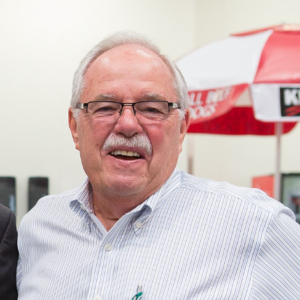James Sinegal
A Retail Icon Who Fought for American Workers
James Sinegal (known better as Jim Sinegal) was born January 1, 1936, in the American manufacturing city of Pittsburgh, Pennsylvania, and was raised in a Catholic working-class family. In true Pittsburgh fashion, his father was a coal miner and steelworker. James attended San Diego City College (then San Diego Junior College) and earned an associate’s degree.
FedMart and Sol Price
Jim Sinegal started at the bottom of the retail business ladder. In 1954, at the age of 18, he got a job as a grocery bagger at FedMart, a chain of discount department stores that has been defunct for over 40 years. FedMart was one of America’s first warehouse retail stores and was founded by Sol Price, a pioneer of the warehouse store retail model. Sinegal didn’t let his initial position in the company deter him. Sinegal worked hard and made his way up the ladder—he earned his bachelor’s degree from San Diego State University while still a bagger.
Sinegal eventually became an executive vice president at FedMart, but in 1979, he left to join Price, who had launched a new membership-based warehouse store after being ousted from FedMart for selling it to a German retailer. At the new store, called Price Club (owned by the Price Company), Sinegal served as executive vice president of merchandising, distribution, and marketing. It was also during this time that Sinegal had a job at Sinegal/Chamberlin and Associates, a broker and sales representative for both nonfood and food products.
He and Sol Price worked together for nearly 30 years, and all of Sinegal’s business philosophy and principles can be attributed to Price’s influence. “He was also one of the toughest people I have ever met in my life,” Sinegal said of Price. “I learned everything [from him].” In 1960, FedMart was retrofitting a building in Dallas that they had purchased. The contractor approached Sinegal and informed him that the building had only one set of restrooms and that it needed two—one for whites and one for “coloreds.” When Sinegal approached Price about the issue, Price adamantly refused. This and many other experiences had an enormous impact on the young Sinegal.
“Sol taught us that business was more than just making money—that you have a contract with the communities in which you do business. That social contract was a concept that we embraced in developing Costco.” Sinegal never wavered from that principle throughout his entire career.
From Costco to PriceCostco to Costco
After only a few years, Jim Sinegal was ready to strike out on his own. He left Price Club to found Costco Wholesale Corporation with Jeffrey Brotman. Like Price Club, Costco was a warehouse club retail store that required a small membership fee of its customers. The first store opened in Seattle on September 15, 1983. The opening received a less than stellar response, but the business built up gradually, and in a year, Costco was already opening up other locations in Washington. Ten years later, Costco acquired Price Club, becoming PriceCostco.
The two companies initially remained separate, and membership could allow customers to shop at either business. They eventually merged officially, and in 1997, Sinegal dropped another price, but this time not for a product—the company name was changed back to Costco Wholesale.
Costco Wholesale Built on Practicality and Social Principles
Costco Wholesale began to increase in popularity as more customers saw the benefit of a Costco membership—low prices and a variety of product options in bulk, all in a no-frills shopping environment. And James Sinegal began making a name for himself, becoming known, for better or for worse, for his shrewd customer-friendly business practices and his generosity toward employees.
He was so generous in fact, that he often irked his shareholders and baffled analysts. From low product prices to high starting wages to low healthcare costs for employees, Sinegal ran a unique business model. But to Sinegal, this generosity wasn’t altruism; it was, according to Sinegal, “simply good business.”
“Nobody will ever be able to say to us that we are making money off the backs of our employees,” Sinegal said, and no one has. Considering Costco’s success since its founding, this strategy has obviously worked.
People before Profit
“He has been too benevolent,” said Emme Kozloff, an analyst at Sanford C. Bernstein & Company, speaking of Sinegal’s treatment of his Costco employees.
The now former CEO was known for refusing high markups on Costco products. He paid his employees far above the average wage in the retail industry, and those employees paid far below average for their healthcare. Sinegal’s salary was also far below the standard for Fortune 100 CEOs.
“I’ve been very well rewarded,” Sinegal said. “If you’re going to try to run an organization that’s very cost-conscious, then you can’t have those disparities.”
Sinegal was also known for being, in his own words, obsessed with Costco’s private brand, Kirkland Signature, often sporting shirts from the brand.
The Legacy Continues
Sinegal and his wife operate a foundation, called simply the Sinegal Family Foundation, which gives out five full-tuition Heritage University scholarships annually; the couple has also made donations to San Diego State University. Sinegal also made an undisclosed donation (between $200,000 and $2 million) to the University of Washington for coronavirus testing research.
Jim Sinegal retired from his CEO position in 2012 and from the company’s board of directors in 2018. Though he’s no longer with Costco Wholesale, the company continues to operate according to Sinegal’s business principles.
From working-class roots to attending San Diego City College and then graduating from San Diego State University as a bagger, to founding and becoming CEO of Costco Wholesale, one of the most popular retail warehouse clubs, Jim Sinegal achieved the American Dream but always kept his focus on how he could help with fewer resources and fewer opportunities. His legacy continues to lives on.

